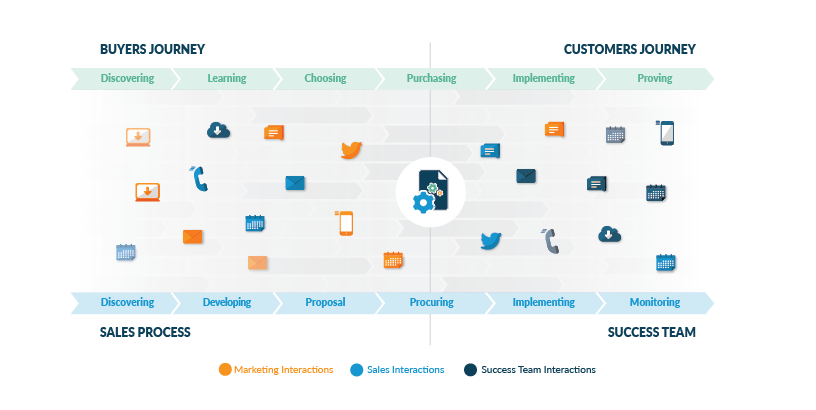Being buyer-centric isn’t always natural to Sales. After all, Sales is working towards its own goals with defined processes and systems. So how can Sales find balance between their own needs and their buyers? Let’s take a look.
A common buyer-centric selling question:
How does the buying process align to the sales process?
A common misconception about buyers:
That they have and follow a defined process. In sales, we often assume buyers have a process that can align with our sales process, but this isn’t always the case. Now, buyers are navigating high-stakes decisions in everchanging buying groups and committees. New people, new requirements, new decisions. Collectively, the elements of these groups are always changing.
Sales expert Dave Brock shares in his post about the realities of a B2B buying process, that “it’s highly unlikely they have a well defined buying process.”
It’s the problems that each buyer faces that are foundationally critical to successful buyer-centric selling.
Sales should understand six specific areas about buyers:
- What industry/market/company specific issues are impacting your buyers?
- What needs are they unaware they have? And how can marketing and sales teams effectively spark awareness?
- What needs are they actively trying to fulfill?
- Where do they go to research solution options?
- Who do they trust in their research?
- What preferences do buyers have for how to research solutions?
There’s many more attributes that will help Sales, but starting here is a great way to get them started.
The Revenue Journey
With a holistic viewpoint of your buyers’ problems—including their journey for learning and research—sales can further achieve buyer-centricity by aligning sales process directly to the buyers journey. This alignment is called the revenue journey (example below). Sales and marketing activities are visualized with how the buying journey and sales stages align. While there may be an absence of a formal buying process, the collective buying committee’s journey likely follows a common set of stages. It’s the needs, activities and preferences within those stages that often change depending on your buying group.  As sales reps reach out to buyers, being aware of how their interactions will align—or not—to marketing touch points and progress in the buyers journey is important to delivering a great experience. The goal here is to establish a buyer-centric view into selling activities.
As sales reps reach out to buyers, being aware of how their interactions will align—or not—to marketing touch points and progress in the buyers journey is important to delivering a great experience. The goal here is to establish a buyer-centric view into selling activities.
Mapping out your revenue journey is a great way to get Sales started with a buyer-focused strategy. See how Akoonu enables sales to have a buyer-centric view of opportunity management directly in Salesforce:

